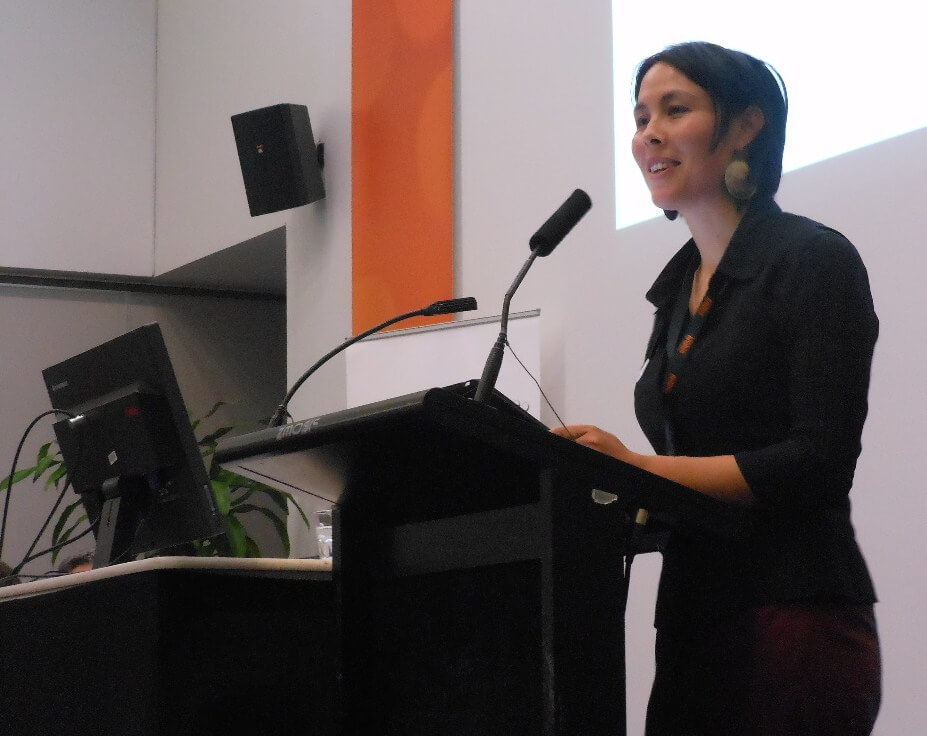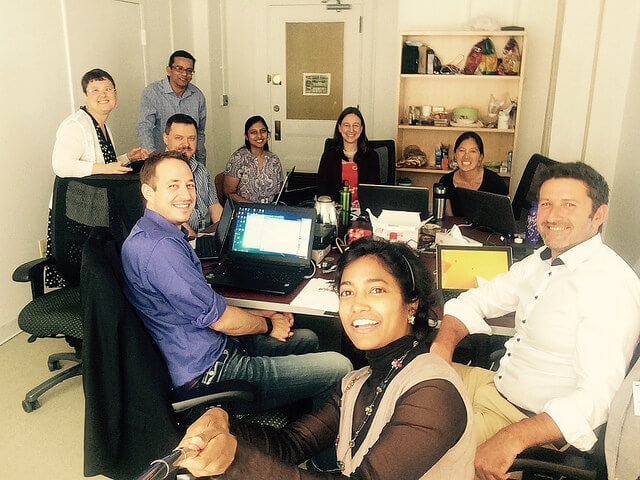I attended the AngleBrackets/DevIntersection tech conference in Las Vegas this past October (as I also did in May), and while I was there I tracked down as many speakers as I could grab and asked them three questions about presenting at conferences:
- Who are you, and what do you do?
- Why do you personally present at conferences such as this one?
- How can someone like me, a regular developer, work toward becoming a presenter at conferences?
I only informed the person I was interviewing of the first question, and they did not hear the other two questions until we were recording, so all the answers you will hear below are off-the-cuff. I recorded all of their responses, which are listed below, and excerpts from those responses are also posted. You can listen to all of the interviews over on SoundCloud.
I've already written about their answers to the second question in Inside the Mind of the Tech Conference Speaker, and now I want to focus on what kinds of answers I got for the third question. So, let's ask the question: how can a developer like me work toward becoming a speaker at a tech conference?

Conference Speaker by Michael Coghlan, used under license
Is This What You Want?
One speaker started at the very beginning: be sure that this is actually what you want to do.
Kathleen Dollard (.NET Coach and Director of Engineering for Real): "The first thing you want to do is decide whether it is something you want to do. I strongly feel [that] everybody doesn't need to be able to present at conferences. Now, I think it's nice if everybody can present to their bullpen or something at lunch, but I don't think it's goal that everybody needs to have."
Passion is Paramount
If you do want to be a presenter, then what qualities should you have? Many of the respondents wanted to point out some traits that skilled technical speakers often possess. Some believe that passion for the topic is most important:
Juval Lowy (software architect, author, founder of IDesign): "First of all, it's not looking at what topics have demand. So you [might say], "Javascript has lots of demand, so I'll present on Javascript". No. The only thing that matters is what you are passionate about. If you are passionate about something, and you have enough [knowledge] from doing it, and you have metrics to suggest it, demonstrate it, and all of that, that's what people that do these conferences want to see.
"In general, what conferences are about nowadays [is] not information, it's about knowledge. There's oodles and oodles of information [out there]. There is a deluge of information. What people desperately need is knowledge and guidance. As much information as we have, the knowledge has completely shrunk to zero. If there is something that you can help people with, and you show that unique insight, and that you are passionate about, that's all that matters."
Anthony van der Hoorn (co-founder of Glimpse): "Finding something that you are passionate about is key number one. For me, it was debugging and diagnostics. Once you're passionate about something, you can get yourself to the point where you feel, 'hey, yeah, I can speak about this.'"
Others believe that a good speaker is also a good storyteller:
Robert Green (Technical Evangelist at Microsoft): "When you talk, you're telling a story. So, you've got half an hour, forty-five minutes, twenty minutes, whatever, to tell a story. What is your story? What is it that you're going to tell people? You've got to understand what your story is. A good speaker is someone that tells a good story."
Master the Basics
One presenter told me that it was important to start preparing well in advance of any conference you want to present at:
Troy Hunt (security writer, creator of HaveIBeenPwned): "Submit a paper. Rather, submit a good paper. The first talks that I did, I just came up with ideas that I thought were good, and I would submit to events. There's [only] one event ever that I can think of that I didn't get to talk at, [and that's] because I've had good proposals."
Another presenter expanded on that idea: the best talk proposals are the ones that provide some uniqueness.
Jay Schmelzer (Director of Program Management for .NET at Microsoft): "Bring uniqueness to your session proposal. If you can come and talk about a technology from the perspective of a problem you had to solve, and how technology helped you do it, that someone else can take and learn from and go implement themselves, [that's important]. While I can tell you what we intended [certain code] to be used for, I didn't actually use it. I didn't write that code and put it production. I didn't live with it for ten years. You have. You can bring that experience into these kinds of things, and make it more real-world."
Remember Your Audience
Many of the presenters admitted to being nervous when speaking, and told me that this was expected:
Shayne Boyer (software architect and blogger, Tattoo Coder): "Every time I get up to talk in front of people, I'm nervous. I could [be] in front of five people or two hundred people, it's the same feeling. [But] I just love to get up here and talk, so it's exciting."
Another reminded me that there are two important components in any presentations: the content and the audience.
Kathleen Dollard: "It's not easy for anyone, and it takes some experience, and it takes some working on who you want to be on stage. If I go on stage and try to be Scott Hanselman, I will not succeed. It will not work. If I go on stage and try to be somebody other than who I am, it's not going to work out very well. That includes figuring out what you care about and how you are going to balance things.
"Every speaker is engaged with two things: one is the content, and one is the audience. One of the things I did when I was first starting out was that I was engaged deeply in the content, but I didn't think as much about what the audience needed and how I needed to connect with [them]. I still work on that, all the time."
Make a Name For Yourself
A couple of the presenters mentioned that it is important to be visible, to have a name that people recognize:
Jay Schmelzer: "[Another way] is making a name for yourself. Someone that doesn't have the benefit of working for Microsoft and being on the product team, having a following on a blog or Twitter or some other [place] where people recognize you and you would be a draw for the conference [is important]. One of the things you see with some of the presenters that are not Microsoft employees is that they are names that are recognized in the Microsoft development community, and people want to go hear them talk."
Start Small
For many of the presenters I talked to, the best path to speaking at a conference was through smaller groups:
Brent Ozar (SQL expert and owner of Brent Ozar Unlimited): "Start by doing lunch-and-learns. Go on YouTube, pick a 15-minute [or] 30-minute covering a topic that you think your coworkers should know. Get everybody together in a conference room (you should have watched the video already). Watch the video with the group, and then you take questions afterwards. Some of the questions you'll be able to answer, some of them you will not. Write those down and say "OK, I'm going to put together a little presentation to cover the questions that you had."
"This way, you don't have to build a [slide] deck, you're just watching along with somebody else, you're seeing how [the presenter] delivers the material, and you're seeing the kinds of questions that people ask that are relevant in your own environment. [Plus,] they're people that you already know and feel comfortable with, so it's just a little bit easier to jump up and say, "alright, now I'm going to tell this story my own way," in front of local user groups or strangers.
Javier Lozano (Owner of LozanoTek): "I would start small. Present at your local user group, present at code camps, present at regional conferences. Get the experience [needed] to deliver content the audiences, so that when you get into a large room and you have 150 people staring at you, you don't have the "deer in the headlights" effect. I'm not saying that you can't immediately [present at big conferences], but practice makes perfect."
Julie Lerman (Consultant and blogger, The Data Farm): "There is a path that, I think, isn't very challenging: local community events. I know people that started [by] giving little mini presentations at work.
"In our community, we have a number of user groups of various technologies, we have a code camp, and we encourage local people [to come and speak]. When we have too many presenters who are submitting, and we have more than we can handle, we do give preference to local speakers, even if they're not the big, national, [well-known] speakers. It doesn't matter. [We're looking for] someone who really has something to share. It doesn't matter how experienced they are. Those are great, safe places to get used to [speaking] and trying things out."
Ward Bell (VP of Technology, IdeaBlade): "I'm sure there are many roads to doing it. For me, and for many people, it starts with user groups. Start giving presentations to smaller groups, code camps, and things like that, and finding your groove and catching fire there. Of course, you have to feel passionate about what you are talking about, and that helps a great deal. You have to find that ability to stand in front of people and really enjoy engaging them."
For a few others, the idea of "lightning talks" lasting only a few minutes provided a great introduction to the world of tech presenting:
Tim Radney (Principal Consultant for SQLSkills.com): "The easiest thing to do is to work with local user groups, and find something that you are passionate about. Get up and show others what you found, how you fixed [some problem you encountered], whether it's a demo in a virtual machine or just slides talking about it with some screenshots. [Start] with a little "lightning talk" of ten to fifteen minutes. Don't feel like you have to do a full hour session your first time."
Steve Smith (Consultant and trainer): "Usually, user groups are a great place to start. If there's not a user group around, you can start one. It doesn't take much to start a user group, you just need to find a place to meet and tell people that you're having it, and whoever shows up, great.
"We have a user group in Hudson that just does lightning talks as presentations, and otherwise we spend the time coding and doing code katas. If you're not comfortable doing a one-hour talk on the topic, you could do a five-minute lightning talk on the thing that you are interested in, and that's pretty easy as far as a low barrier to entry."
Practice, Practice, Practice
Even after you've started presenting to other people, don't forget that no one gets truly proficient at anything without practice:
Dan Wahlin (consultant, author, founder of Wahlin Consulting): "John Papa and I chair the ASP.NET tracks at this conference, so we're the ones that pick the speakers. I can tell you that the number one thing is to get that practice in. If you apply and we've never seen a video of you, we've never even heard of you, at a conference this large we can't just bring anyone in. We've got to have that confidence that they are a top-level speaker.
"[Presenting] is not about getting up and speaking, it's about getting up and teaching. You have an hour, and [you have to] try to cram as much information in without overwhelming [the attendees], and get that proper pace, and it's hard to get right. You've gotta practice. Put yourself out there! Start requesting to speak at code camps, user groups, all that fun. You've got to build up your name enough such that, when you submit, [conference organizers] have heard of you or can at least go to your blog.
"Give me thirty seconds of your video, and I can tell you if we want to have you or not."
Moving On Up
After getting over your nervousness, mastering the basics, and doing all that practice, there's only one thing left to do: move on up the chain. Once you get more comfortable with the smaller groups, you can move up to local user groups, code camps, and regional conferences.
Scott Hanselman (Community Manager for ASP.NET and Azure Web Tools at Microsoft): "The way I did it was [to] start with Toastmasters (a non-profit organization that helps people improve their public speaking skills). [Then] you start doing basic presentations. Do a brown-bag at work in front of five of your friends, turn that into a user group talk, and then a user group talk can become a local code camp, a local code camp becomes a local conference, a local conference becomes a regional conference, and you get the idea."
Billy Hollis (UX and front-end consultant, author): "I get asked that a lot. Usually, the path is through some kind of track record that you form with local user groups or some of the regional conferences. There are a number of regional conferences; in Tennessee for example, we have one called DevLink, [and there's] about a thousand people that come to that per year. Because it is regional and because it is pretty big, people who have never spoken before have a chance to speak there.
"Being able to speak at some of those regional conferences, and then honing your material and getting some evidence that your evaluations are pretty good, are things that can get you considered to speak at one of these more [national] conferences."
Summary
Many speakers had the same overriding ideas: you gotta practice, start small, not worry about being nervous, then move up slowly, all the while building your name recognition and draw power. It's not easy, but from the passion that I heard in each of these people's voices when they talked to me about their drive, their need to teach and present, it is clear that, to them, the experience is truly rewarding.
Thanks again to all the speakers that generously donated their time to this project. I am so grateful to each and every one of you.
Please let me know what you think about this project in the comments, and if I should do it again at the next conference.
Happy Speaking!









